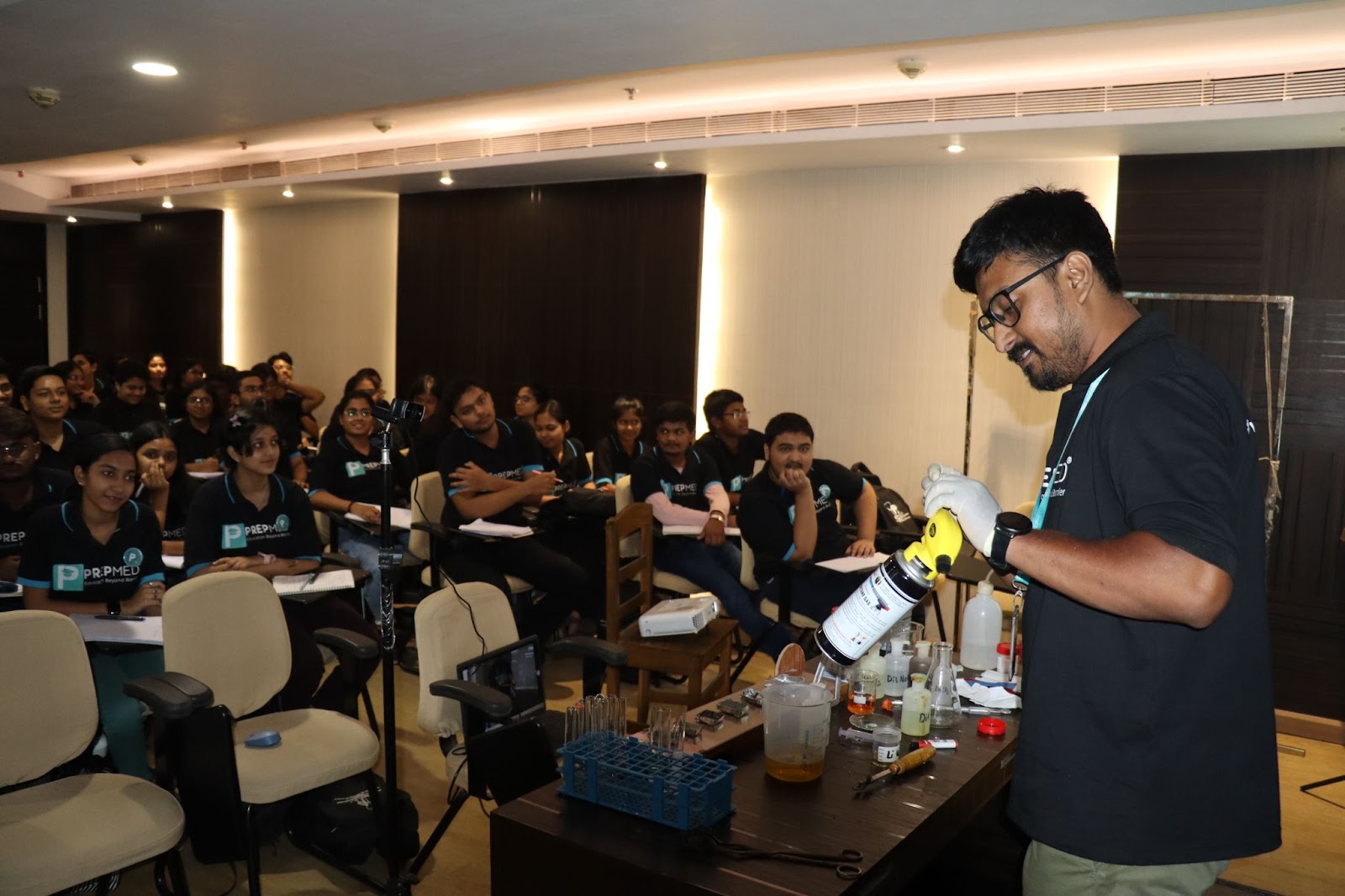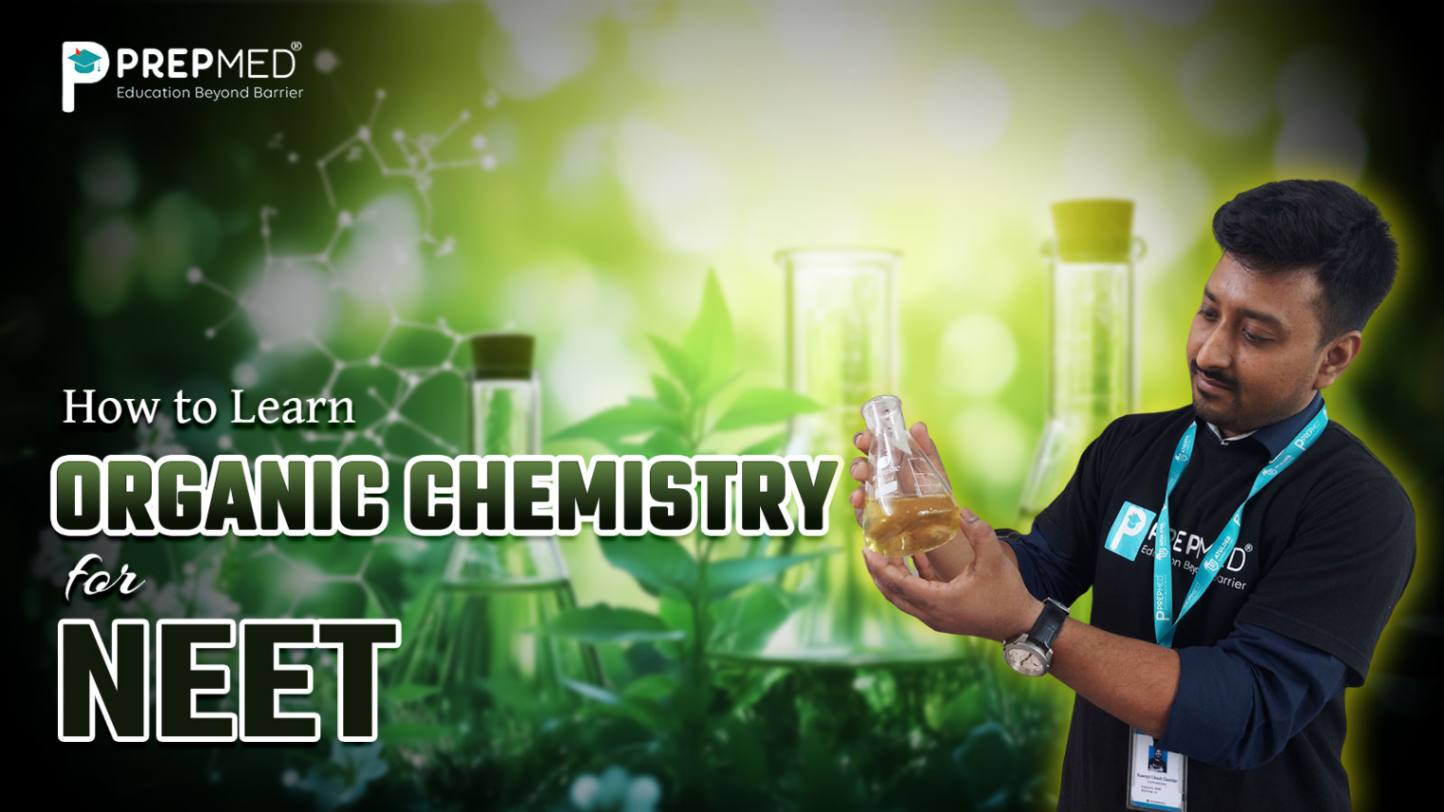September 11, 2024
How to Study Organic Chemistry for NEET
Many students struggle with organic chemistry due to the vast number of reactions, mechanisms, and concepts involved. But with the right approach, it can become a scoring subject. Mastering organic chemistry requires a deep understanding of concepts, regular practice, and strategic learning. Here’s a step-by-step guide on how to study organic chemistry for NEET.
Understanding Basic Concepts
Organic chemistry is built of fundamental concepts such as hybridization, bonding, molecular structures, and functional groups. Before diving into complex reactions, it's essential to have a clear grasp of these basics. A strong understanding will make it easier to comprehend reaction mechanisms and predict outcomes in reactions.
Prepmed suggests students to focus on the structure of molecules, isomerism, resonance, inductive and mesomeric effects as they are very crucial. Also, NCERT textbooks are a must for clarity.
Focusing on Important Reactions and Mechanisms
Organic chemistry in NEET primarily emphasizes reactions, particularly involving alkanes, alkenes, alkynes, alcohols, aldehydes, ketones, and carboxylic acids. It is essential to memorize these fundamental reactions, along with their mechanisms and the reagents involved. Having a clear understanding of the step-by-step processes allows students to predict the products of unfamiliar reactions, which is crucial for substitution, addition, and elimination reactions.
Moreover, grasping how different conditions, such as temperature, catalysts, and solvents, influence the reaction pathway can significantly enhance one's ability to tackle complex problems in the exam. Prepmed suggests creating reaction charts, mind maps for quick revision of name reactions and reaction mechanisms and Practice drawing reaction mechanisms to visualize how bonds are broken and formed.
Practicing Conversions
Conversions form an important part of the NEET organic chemistry section. Being able to convert one functional group into another (e.g., alcohols to aldehydes, or acids to esters) can give students an edge. Mastering this skill requires understanding the pathways and reagents that can drive these conversions.
Make a Reaction Concised Note Sheet

One of the best ways to revise organic reactions is by creating a concise note sheet. Writing down all the important reactions, along with their reagents, mechanisms, and products. This will serve as a quick reference during revision time and can save you time before the exam. PrepMed suggests students use different colors for different types of reactions (e.g., red for substitution, blue for elimination) and include exceptional cases and important reaction conditions.
Memorize Functional Groups and IUPAC Naming
Organic Chemistry deals with a variety of functional groups like the identification and properties of functional groups like alcohols, aldehydes, ketones, carboxylic acids, and amines. Also, mastering IUPAC nomenclature is essential for identifying compounds correctly in NEET.
Solve Previous Year Papers
The best way to understand the types of questions asked in NEET is by solving previous year’s papers. Organic chemistry questions often follow a pattern, and practicing these questions helps to familiarize aspirants with common trends and frequently asked concepts.
Regular Revision
Organic chemistry requires consistent revision. Since it involves a lot of reactions and mechanisms, NEET aspirants must revise regularly. Setting aside time each week for organic chemistry revision can help students memorize for longer.
Mastering organic chemistry for NEET requires a structured and concept-driven approach. By focusing on building a strong grasp of the basics, thoroughly studying the NCERT textbook, and understanding reaction mechanisms, students can significantly advance their performance. With consistent effort, strategic problem-solving, and by solving past papers, students can confidently tackle Organic Chemistry and improve their overall NEET score. A disciplined study plan will ensure Organic Chemistry becomes an advantage rather than a challenge in the exam.
To improve your understanding of reaction mechanisms:
- Visual Learning: Practice drawing mechanisms step-by-step to visualize the process of bond formation and breakage.
- Conceptual Understanding: Focus on the 'why' behind each step in a mechanism to understand the movement of electrons.
- Categorization: Group similar mechanisms together to notice patterns and common principles.
- Teaching Others: Explain mechanisms to peers or even to yourself aloud, as teaching can reinforce your own understanding.
Utilize Resources: Refer to trusted textbooks like NCERT and additional reference books for detailed explanations.
Frequently Asked Questions:
1. Why is understanding basic concepts important in Organic Chemistry for NEET?
Organic Chemistry is built on fundamental concepts like hybridization, bonding, molecular structures, and functional groups. A solid grasp of these basics is essential for comprehending reaction mechanisms and predicting the outcomes of various reactions. Without a strong foundation, it becomes difficult to master more complex topics.
2. What fundamental concepts should I master before studying complex organic reactions?
Before diving into complex reactions, you should have a strong grasp of basic concepts like hybridization, bonding, molecular structures, and functional groups. Understanding isomerism, resonance, inductive effects, and mesomeric effects is also crucial. A solid foundation in these areas enables you to comprehend reaction mechanisms more effectively and predict the outcomes of reactions with unfamiliar compounds.
3. Why is practicing conversions important in Organic Chemistry for NEET?
Conversions form a significant part of the NEET Organic Chemistry section. Being able to convert functional groups (e.g., alcohols to aldehydes or acids to esters) gives students an edge in the exam. Understanding the pathways and reagents for these conversions is key to solving conversion-based problems effectively.
4. How can solving previous year's NEET papers help in Organic Chemistry preparation?
Solving previous years' NEET papers helps students familiarize themselves with common trends, question patterns, and frequently asked concepts in Organic Chemistry. It also allows aspirants to assess their knowledge, identify weak areas, and improve their problem-solving skills.
Follow Us - on Facebook /Instagram/ YouTube






